We examined the final week of the prophet Isa al Masih PBUH. The Injil records that he was crucified on Day 6 – Good Friday, and he was raised back to life the following Sunday. The Taurat and the Psalms and Prophets both foresee this. But why did this happen and what does it mean for you and me today? Here we seek to understand what the Prophet Isa al Masih offers, and how we can receive mercy and forgiveness. This will help us even understand Ibrahim’s ransom described in Surah As-Saffat (Surah 37), Surah al Fatihah (Surah 1 – The Opener) when it asks Allah to ‘show us the Straight Way’. As well, it will help us understand why ‘Muslim’ means ‘one who submits’, and why religious observances like wudu, zakat and eating halal are good intentions but insufficient in themselves for the Day of Judgment.
Bad News – what the Prophets say of our relationship with Allah
The Taurat teaches that when Allah created mankind He
So God created mankind in his own image,
in the image of God he created them;
male and female he created them. (Genesis 1:27)
This doesn’t mean “image” in a physical sense, but rather that God made us reflect Him in the way we function emotionally, mentally, socially and spiritually. We were created to be in a relationship with Him. We can visualize this relationship in the slide below. The Creator, as an infinite ruler, is placed at the top while man and woman are placed at the bottom of the slide since we are finite creatures. The connecting arrow shows this relationship.
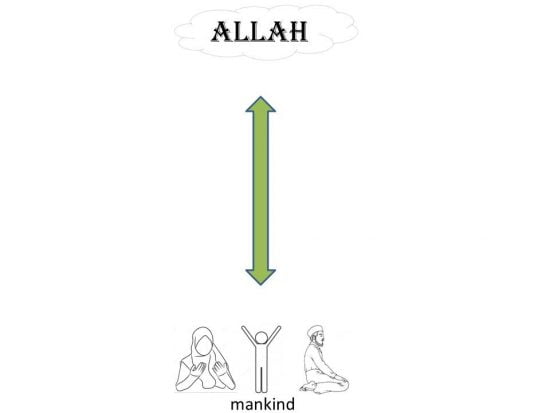
Allah is perfect in character – He is Holy. Because of this the Zabur says
For you are not a God who is pleased with wickedness;
with you, evil people are not welcome.
5 The arrogant cannot stand
in your presence.
You hate all who do wrong (Psalm 5: 4-5)
Adam committed one act of disobedience – only one – and the Holiness of God required Him to judge. The Taurat and Qur’an record that Allah made him mortal and expelled him His presence. The same situation exists for us, that when we sin or disobey in any way we dishonour Allah. Since we do not act according to the image that we were made in, our relationship with the Creator is broken. This results in a barrier as solid as a rock wall that comes between us and our Creator.
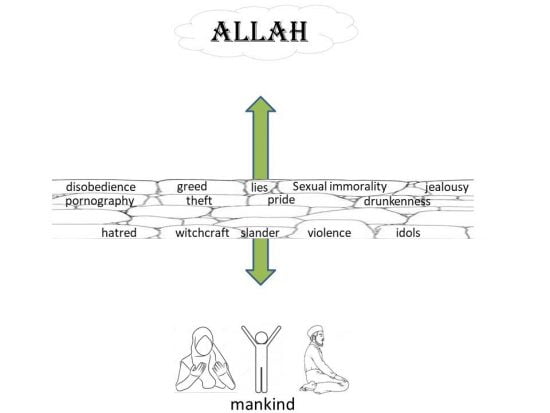
Piercing Sin’s barrier by Religious Merit
Many of us try to pierce this barrier between us and Allah through religious deeds or works that earn enough merit to break the barrier. Prayers, fasting, Hajj, going to the mosque, zakat, and alms to charity are the ways we seek to earn merit to pierce the barrier as illustrated next. The hope is that religious merit will cancel out some sin. If our many deeds earn enough merit we hope to cancel all our sins and receive mercy and forgiveness.
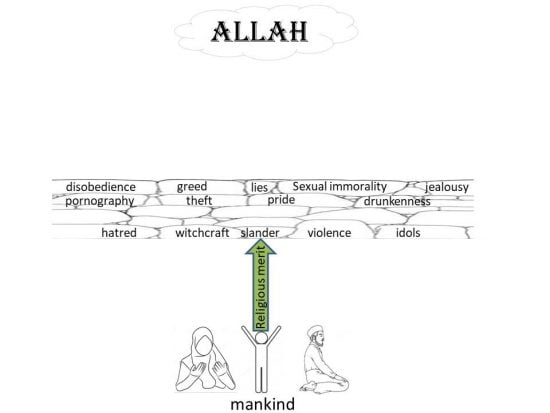
But how much merit do we need to cancel sin? What is our assurance that our meritorious deeds will be sufficient to cancel the sin and pierce the barrier that has come between us and our Creator? Do we know if our efforts for good intentions will be sufficient? We have no assurance and so we try to do as much as we can and hope it will be sufficient on Judgment Day.
Along with deeds to gain merit, and efforts for good intentions, many of us work hard to stay clean. We diligently perform wudu before prayers. We work hard to stay away from people, objects and food that make us unclean. But the prophet Isaiah revealed that:
All of us have become like one who is unclean,
and all our righteous acts are like filthy rags;
we all shrivel up like a leaf,
and like the wind our sins sweep us away. (Isaiah 64:6)
The prophet tells us that even if we avoid everything that makes us unclean, our sins will make our ‘righteous acts’ as useless as ‘filthy rags’ in making us clean. That is bad news. But it gets worse.
Worse News: the Power of Sin and Death
The Prophet Musa PBUH clearly set the standard in the Law that it requires total obedience. The law never said something like “attempt to follow most of the commands”. In fact, the Law stated time and again that the only work that assured payment for sin was death. We saw in the time of Nouh PBUH and even with the wife of Lut PBUH that death resulted from sin.
The Injil summarizes this truth in the following way:
For the wages of sin is death… (Romans 6:23)
“Death” literally means ‘separation’. When our soul separates from our body we die physically. Similarly, we are even now separated from God spiritually and are dead and unclean in His sight.
This reveals the problem of our hope of earning merit to pay for sin. The problem is that our hard efforts, merits, good intentions, and deeds, though not wrong, are insufficient because the payment required (the ‘wages’) for our sins is ‘death’. Only death will pierce this wall because it satisfies God’s justice. Our efforts to gain merit are like trying to cure cancer (which results in death) by eating halal food. Eating halal is not bad, it is good – and one should eat halal – but it will not cure cancer. For cancer, you need a totally different treatment that puts the cancerous cells to death.
So even in our efforts and good intentions to generate religious merit, we are actually dead and unclean as a corpse in the sight of our Creator.
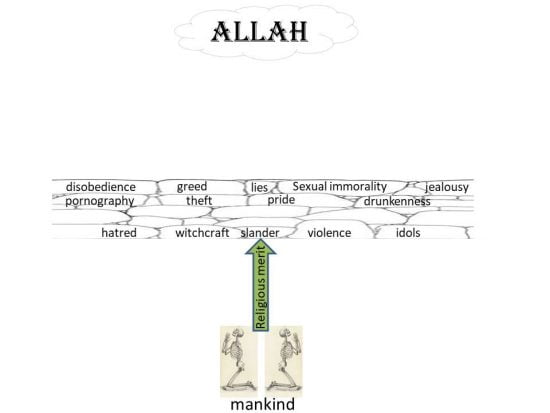
Ibrahim – showing the Straight Path
It was different with the Prophet Ibrahim PBUH. He was ‘credited righteousness’, not because of his merit but because he believed and trusted the promise to him. He trusted Allah to meet the payment required, rather than earning it himself. We saw in his great sacrifice that death (the payment for sin) was paid, not by his son but instead by a lamb provided by God.
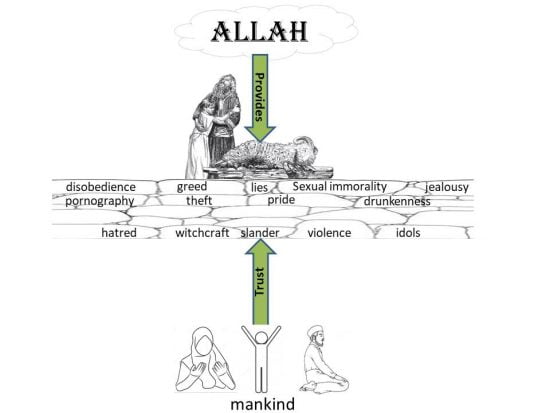
The Quran speaks of this in Surah As-Saffat (Surah 37 – Those who set the Ranks) where it says:
And we ransomed him with a momentous sacrifice. And we left (the blessing) for him among generations (to come) in later times. “Peace and salutation to Ibrahim” (Surah As-Saffat 37:107-109)
Allah ‘ransomed’ (paid the price) and Ibrahim received the blessing, mercy and forgiveness, which included ‘peace’.
Good News: The work of Isa al Masih on our behalf
The example of the prophet is there to show us the Straight Path in accordance with the request of Surah Al-Fatihah (Surah 1 – The Opening):
Sovereign of the Day of Recompense.
It is You we worship and You we ask for help.
Guide us to the straight path –
The path of those upon whom You have bestowed favor, not of those who have evoked [Your] anger or of those who are astray. (Surah al-Fatihah 1:4-7)
The Injil explains that this was an illustration to show how Allah would pay for sin and provide a cure for death and uncleanness in a simple but powerful way.
For the wages of sin is death but the gift of God is eternal life in Christ Jesus our Lord (Romans 6:23)
Up until now, it has all been ‘bad news’. But ‘Injil’ literally means ‘good news’ and in declaring that the sacrifice of Isa’s death is sufficient to pierce this barrier between us and God we can see why it is good news as shown.
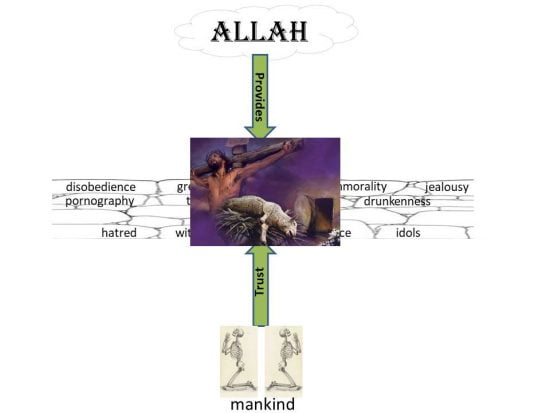
The prophet Isa al Masih was sacrificed and then rose from the dead as the first fruits. So, he now offers us his new life and we need no longer remain prisoners of sin’s death.
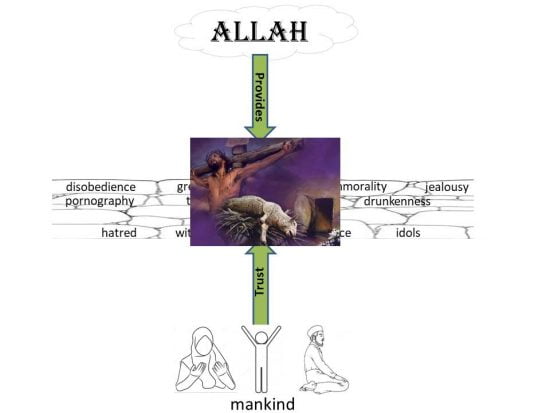
In his sacrifice and resurrection, Isa al Masih became the gate through the barrier of sin that separates us from God. This is why the prophet said:
I am the gate; whoever enters through me will be saved. They will come in and go out, and find pasture. 10 The thief comes only to steal and kill and destroy; I have come that they may have life, and have it to the full.
(John 10:9-10)
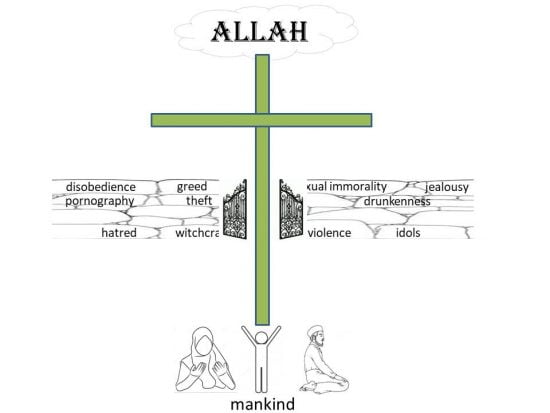
Because of this gate, we now can regain the relationship we had with our Creator before our sin became a barrier. Now, we can be sure of receiving mercy and the forgiveness of our sins.
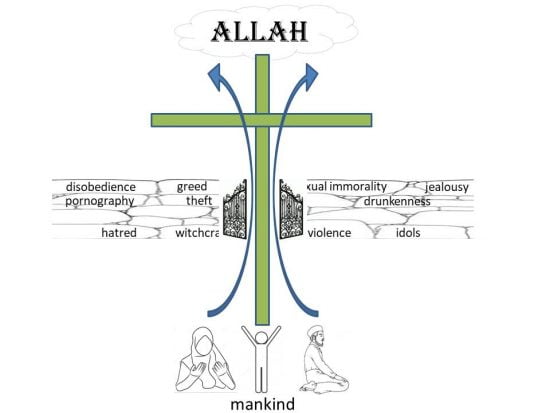
As Injil declares:
For there is one God and one mediator between God and mankind, the man Christ Jesus, 6 who gave himself as a ransom for all people. This has now been witnessed to at the proper time. (1 Timothy 2:5-6)
The Gift of God to you
The prophet ‘gave himself’ for ‘all people‘. So this must include you as well as me. Through his death and resurrection, he has paid the price to be a ‘mediator’ and offers us life. How is this life given?
For the wages of sin is death but the gift of God is eternal life in Christ Jesus our Lord (Romans 6:23)
A Gift must be given
Notice how it is given to us. It is offered as a …‘gift’. Think about gifts. No matter what the gift is, if it is really a gift it is something that you do not work for and do not earn by merit. If you earned it the gift would no longer be a gift – it would be a wage! In the same way, you cannot merit or earn the sacrifice of Isa al Masih. It is a gift – it is that simple.
And what is the gift? It is ‘eternal life’. That means that the sin which brought you and me death is now paid up. God loves you and me that much. It is that powerful.
So how do you and I obtain eternal life? Again, think of gifts. If someone wants to give you a gift you must ‘receive’ it. Anytime we have a gift offered to us there are only two alternatives. Either we can refuse the gift (“No thank you”) or we can receive it (“Thank you for the gift. I will take it”). So too must we receive this gift. We cannot just mentally believe in, study or understand it. To be of benefit, we must ‘receive’ any gift offered to us.
Yet to all who did receive him, to those who believed in his name, he gave the right to become children of God— 13 children born not of natural descent, nor of human decision or a husband’s will, but born of God (John 1:12-13)
In fact, the Injil says of God that
God our Savior, who wants all people to be saved … (1 Timothy 2:3-4)
Receiving the Gift
He is a Saviour and His desire is that ‘all people’ receive his gift so He can save them from sin and death. If this is His will, then to receive his gift would simply be submitting to His will – the very meaning of the word ‘Muslim’ – one who submits. So how do we receive this gift? The Injil says that
Everyone who calls on the name of the Lord will be saved
Romans 10:12
Notice that this promise is for ‘everyone’. Since he rose from the dead Isa al Masih is alive even now. So if you call on him he will hear and give his gift to you. You call out to him and ask him. Perhaps you have never done this. Below is a guide that can help you. It is not a magic chant or the specific words that give power. It is the trust of Ibrahim, that we place in Isa al Masih to give us this gift. As we trust him He will hear us and answer. The Injil is powerful, and yet also so simple. Feel free to follow this guide if you find it helpful.
Dear Prophet and Lord Isa al Masih. I understand that with my sins I am separated from Allah my Creator. Though I can try hard, my efforts do not pierce this barrier. But I understand that your death was a sacrifice to wash away all my sins and make me clean. I know that you rose from the dead after your sacrifice so I believe that your sacrifice was sufficient and so I submit to you. I ask you to please cleanse me from my sins and mediate with my Creator so I can have eternal life. Thank you, Isa the Masih, for doing all this for me. Would you even now continue to guide me in my life so I can follow you as my Lord?
In the name of Allah, Most Merciful.